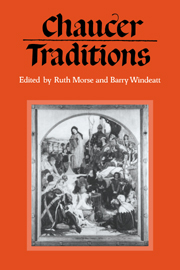Book contents
- Frontmatter
- Contents
- List of contributors
- Preface
- Note on the text
- 1 Chaucer traditions
- 2 Gower–Chaucer's heir?
- 3 Chaucer and Lydgate
- 4 Hoccleve and Chaucer
- 5 Chaucer and fifteenth-century romance: Partonope of Blois
- 6 Some Chaucerian themes in Scottish writers
- 7 The planetary gods in Chaucer and Henryson
- 8 Gavin Douglas: ‘Off Eloquence the flowand balmy strand’
- 9 Skelton's Garlande of Laurell and the Chaucerian tradition
- 10 Chaucerian metre and early Tudor songs
- 11 Aspects of the Chaucerian apocrypha: animadversions on William Thynne's edition of the Plowman's Tale
- 12 The shape-shiftings of the Wife of Bath, 1395–1670
- 13 The genius to improve an invention: transformations of the Knight's Tale
- 14 From the Clerk's Tale to The Winter's Tale
- 15 The Virtuoso's Troilus
- 16 Rewriting romance: Chaucer's and Dryden's Wife of Bath's Tale
- 17 Chaucer's religion and the Chaucer religion
- 18 A list of the published writings of Derek Brewer
- Index
3 - Chaucer and Lydgate
Published online by Cambridge University Press: 23 September 2009
- Frontmatter
- Contents
- List of contributors
- Preface
- Note on the text
- 1 Chaucer traditions
- 2 Gower–Chaucer's heir?
- 3 Chaucer and Lydgate
- 4 Hoccleve and Chaucer
- 5 Chaucer and fifteenth-century romance: Partonope of Blois
- 6 Some Chaucerian themes in Scottish writers
- 7 The planetary gods in Chaucer and Henryson
- 8 Gavin Douglas: ‘Off Eloquence the flowand balmy strand’
- 9 Skelton's Garlande of Laurell and the Chaucerian tradition
- 10 Chaucerian metre and early Tudor songs
- 11 Aspects of the Chaucerian apocrypha: animadversions on William Thynne's edition of the Plowman's Tale
- 12 The shape-shiftings of the Wife of Bath, 1395–1670
- 13 The genius to improve an invention: transformations of the Knight's Tale
- 14 From the Clerk's Tale to The Winter's Tale
- 15 The Virtuoso's Troilus
- 16 Rewriting romance: Chaucer's and Dryden's Wife of Bath's Tale
- 17 Chaucer's religion and the Chaucer religion
- 18 A list of the published writings of Derek Brewer
- Index
Summary
John Lydgate was considered to be a very important poet in his own day and for at least a century afterwards: he received many commissions to write poems from patrons in all walks of life; his poetry was widely admired and imitated; he is frequently alluded to, usually in conjunction with Gower and Chaucer, as one of the founding fathers of English poetry; there are many manuscripts of his works. In more recent times he has been more or less universally contemned and become the butt of every jibe, especially for his prolixity and the great bulk of his writing. He now appears like a great whale helplessly beached on the shore of reputation. The tide has gone out, or elsewhere. Nature was resting, and Lydgate was born. What really happened?
The difference of opinion, so stark and apparently inexplicable, is a challenge, and various explanations have been offered, usually involving extremely derogatory estimates of the good sense of Lydgate's fifteenth-century admirers, or else unlikely suggestions as to the merit of his verses. In taking up the challenge, again, one would not want to become embroiled in further debate about whether Lydgate's poetry is any good. There is no need for a debate: it is not very good. It is often dull, especially in long stretches, and it usually comes in long stretches. It is hard work to read, and the most skilful reader, however optimistic he is about Lydgate's versification, will stumble every few lines.
- Type
- Chapter
- Information
- Chaucer TraditionsStudies in Honour of Derek Brewer, pp. 39 - 53Publisher: Cambridge University PressPrint publication year: 1990
- 2
- Cited by



